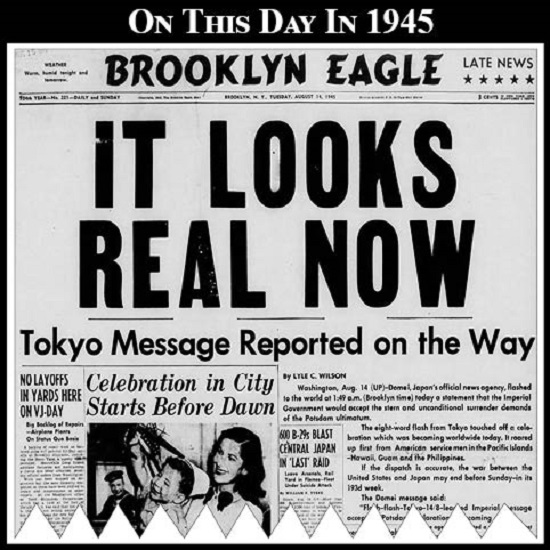ON THIS DAY IN 1945: It looks real now

ON THIS DAY IN 1945, the Eagle reported, “The city’s joy, long pent by tension, fear and disappointment, began to trickle out with the pre-dawn report of Japanese surrender in an increasing flow that promised to become a flood of jubilation as the day went on. Chinatown, whose people have suffered the longest from war, was first to let go. Barely an hour after the 1:49 a.m. Domei flash, they were snake-dancing and shooting off firecrackers and breaking out flags along the narrow winding streets. By 6 a.m. the famous New Year’s papier-mache dragon was being parade on Mott Street and extra police were out … Church bells started to ring in Flatbush and before 4 a.m. there were bonfires in Borough Park and Red Hook … Little boys dashed out on the street in their pajamas and began banging kitchen pots … Mothers called out of the windows to the darkened bedrooms of other mothers who still hadn’t heard … In the Borough Hall section, people pouring out of the subways to their jobs made a rush for papers.”
****
ON THIS DAY IN 1868, the Brooklyn Daily Eagle reported, “Bathers at Coney Island, Fort Hamilton and other points along the shore, should be careful not to venture out far just about this time, as there is reason to believe a shoal of sharks are prowling about the bay. One of these murderous monsters, seven feet in length, was captured yesterday off the pier foot of Barclay Street, North River.

Brooklyn Boro
View MoreNew York City’s most populous borough, Brooklyn, is home to nearly 2.6 million residents. If Brooklyn were an independent city it would be the fourth largest city in the United States. While Brooklyn has become the epitome of ‘cool and hip’ in recent years, for those that were born here, raised families here and improved communities over the years, Brooklyn has never been ‘uncool’.